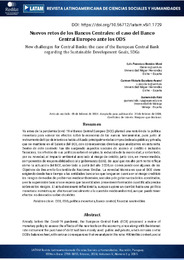Por favor, use este identificador para citar o enlazar este ítem:
https://hdl.handle.net/11000/34864Registro completo de metadatos
| Campo DC | Valor | Lengua/Idioma |
|---|---|---|
| dc.contributor.author | Escolano-Asensi, Carmen Victoria | - |
| dc.contributor.author | Brotons Muró, Luis Francisco | - |
| dc.contributor.author | Ruiz, Gumersindo | - |
| dc.contributor.other | Departamentos de la UMH::Estudios Económicos y Financieros | es_ES |
| dc.date.accessioned | 2025-01-18T08:07:33Z | - |
| dc.date.available | 2025-01-18T08:07:33Z | - |
| dc.date.created | 2024 | - |
| dc.identifier.citation | LATAM. Revista Latinoamericana de Ciencias Sociales y Humanidades | es_ES |
| dc.identifier.issn | 2789-3855 | - |
| dc.identifier.uri | https://hdl.handle.net/11000/34864 | - |
| dc.description.abstract | Ya antes de la pandemia Covid-19 el Banco Central Europeo (BCE) planteó una revisión de la política monetaria para valorar los efectos sobre la economía de las nuevas herramientas, pues junto al instrumento del tipo de interés se había utilizado principalmente la compra de deuda pública y privada, que se mantiene en el balance del BCE, con consecuencias diversas que analizamos en esta nota. Dentro de este contexto han ido surgiendo aspectos sociales de acceso al crédito e inclusión financiera, los efectos de sus políticas sobre el empleo, la reducción de la morosidad, y sobre todo, por su novedad, el impacto ambiental asociado al riesgo de crédito, junto con, en menor medida, componentes de responsabilidad social y gobernanza (ESG). De aquí que resulte pertinente reflejar cómo la actuación del BCE, sobre todo a partir del año 2020, se corresponde con algunos de los Objetivos de Desarrollo Sostenible de Naciones Unidas. La novedad técnica es que el BCE viene exigiendo desde hace tiempo a las entidades bancarias que tengan en cuenta en el riesgo crediticio los riesgos derivados de problemas medioambientales, sociales y de gobernanza de los acreditados, y en la supervisión bancaria se espera que las entidades presenten información cuantificada precisa sobre estos riesgos. El actual escenario inflacionista, aunque supone un cambio hacia una política monetaria restrictiva, no afecta sustancialmente a la cuestión medioambiental, aunque puede tener efectos no deseados sobre el crédito. | es_ES |
| dc.description.abstract | Already before the Covid-19 pandemic, the European Central Bank (ECB) proposed a review of monetary policy to assess the effects of the new tools on the economy, since along with the interest rate instrument the purchase of debt had been mainly used. public and private, which remains on the ECB's balance sheet, with various consequences that we analyze in this note. Within this context, social aspects of access to credit and financial inclusion have emerged, the effects of their policies on employment, the reduction of delinquencies, and above all, due to their novelty, the environmental impact associated with credit risk, together with, to a lesser extent, social responsibility and governance (ESG) components. Hence, it is pertinent to reflect how the ECB's actions, especially from 2020 onwards, correspond with some of the United Nations Sustainable Development Goals. The technical novelty is that the ECB has long been requiring banking entities to take into account in credit risk the risks derived from environmental, social and governance problems of borrowers, and in banking supervision entities are expected to present accurate quantified information about these risks. The current inflationary scenario, although it represents a change towards a restrictive monetary policy, does not substantially affect the environmental issue, although it may have undesirable effects on credit. | es_ES |
| dc.format | application/pdf | es_ES |
| dc.format.extent | 13 | es_ES |
| dc.language.iso | spa | es_ES |
| dc.publisher | Redilat | es_ES |
| dc.relation.ispartofseries | 5 | es_ES |
| dc.relation.ispartofseries | 1 | es_ES |
| dc.rights | info:eu-repo/semantics/openAccess | es_ES |
| dc.rights | Attribution-NonCommercial-NoDerivatives 4.0 Internacional | * |
| dc.rights.uri | http://creativecommons.org/licenses/by-nc-nd/4.0/ | * |
| dc.subject | ODS | es_ES |
| dc.subject | ESG | es_ES |
| dc.subject | Política monetaria | es_ES |
| dc.subject | Banco central | es_ES |
| dc.subject | Finanzas sostenibles | es_ES |
| dc.subject | SDG | es_ES |
| dc.subject | Monetary policy | es_ES |
| dc.subject | Central bank | es_ES |
| dc.subject | sustainable finance | es_ES |
| dc.subject.other | CDU::3 - Ciencias sociales::33 - Economía | es_ES |
| dc.title | Nuevos retos de los Bancos Centrales: el caso del Banco Central Europeo ante los ODS | es_ES |
| dc.title.alternative | New challenges for Central Banks: the case of the European Central Bank regarding the Sustainable Development Goals, SDGs | es_ES |
| dc.type | info:eu-repo/semantics/article | es_ES |
| dc.relation.publisherversion | https://doi.org/10.56712/latam.v5i1.1729 | es_ES |

Ver/Abrir:
Artículo Revista LATAM.pdf
416,69 kB
Adobe PDF
Compartir:
 La licencia se describe como: Atribución-NonComercial-NoDerivada 4.0 Internacional.
La licencia se describe como: Atribución-NonComercial-NoDerivada 4.0 Internacional.
.png)